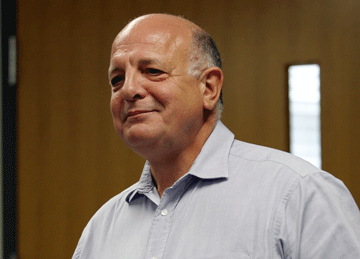 Peter Bankart and I connected immediately almost 28 years ago when Julia and I arrived at Wabash. I can’t believe that he and Brenda are retiring this year—it’s a loss for me, for Wabash, and especially for the students. But I guess the time has come, and the lure of the comfortable house in the Vermont woods is overwhelming.
Peter Bankart and I connected immediately almost 28 years ago when Julia and I arrived at Wabash. I can’t believe that he and Brenda are retiring this year—it’s a loss for me, for Wabash, and especially for the students. But I guess the time has come, and the lure of the comfortable house in the Vermont woods is overwhelming.
That was, in fact, the basis for our first connection—the East coast. As transplants from New York City to Crawfordsville, Julia and I were immediately drawn to people who didn’t see having dinner at the Redwood Inn as the highlight of their week. I don’t want to say we were snobby elitists who turned up our noses at any Indiana ribeye, no matter how well cooked. However, like John Fischer, another Brooklyn boy, we were used to a variety of good restaurants, and those were just not available here 30 years ago. Brenda and Peter knew and loved fine food, and went to Dartmouth, and gave great dinner parties, and this made us feel that we could, perhaps, exist here for a few years.
Yet my connection to Peter ran deeper than the terrific sushi and sake he and Brenda served after returning from Japan. It had to do with our identities as men and our intuitive mutual belief that we needed to try to become better men, for our families, our students, and ourselves. In a way I always envied Peter’s access to students’ inner lives as he worked as a college psychological counselor. I enjoyed when students would drop by my office to share their problems, yet when things got too emotionally charged, I sent them to Peter. I cannot now imagine how he could spend all those years hearing myriad painful stories he heard every week. Yes, he was a professional, but I know that, especially as the father of a son, he empathized with their struggles. Consequently, he understood the students in a different way than any of us.
I know this because Peter would constantly talk about students—never by name of course—and, as a result, helped us do our jobs better by revealing how they were really experiencing their time at Wabash. He also helped them by responding to what he was hearing privately. In the early 80s Peter and Brenda began a program they called "man-to-man," which provided a safe way for homosexual students to reach out to others. In those pre-’shOUT days Wabash was a particularly intolerant place for gays, and Peter, who had been dealing with its effects in his counseling sessions, hoped to change an environment that was sending him so many distraught students. The idea, while a bit ahead of its time here, set the stage for ’shOUT’s emergence just a few years later.
Peter is also, of course, a marvelous, charismatic teacher, and affected students in the classroom, as well as through his research and writing. Here we connected again as part of a new academic movement called "men’s studies," begun by men of our generation, strongly influenced by feminism, who wanted to help women by educating men, including ourselves, to be happier and better human beings—less angry, less dominating, healthier physically and emotionally.
Peter’s freshman tutorial on masculinity, and his course on human sexuality, a perennial student favorite, have no doubt changed the lives of many Wabash men. And research on the psychological development of college-aged males that he and Brenda continue to do has provided new, potentially transformative knowledge to audiences well beyond Wabash.
Recently Peter published a book that reveals our connectedness at its deepest level. In Freeing the Angry Mind: How Men Can Use Mindfulness & Reason to Save Their Lives & Relationships, he speaks not only to me, but to a majority of men, and to many women as well. Years ago I wrote a book called Legacy of Rage that analyzed the narratives of anger and violence that permeate our culture. But Peter’s book, written for a wider audience, shows how intellectual awareness is only a step in the process of healing. The exercises he suggests—using Buddhist principles in conjunction with cognitive therapy techniques—are designed to literally change our feelings and behavior. They are well-crafted, tested, and fun, yet not merely another drop in the ocean of self-help books. Developing a sense of compassion—for us, for others, and for the world—is shown to be the primary means of getting beyond the destructiveness of anger. In showing us, in a very practical way, how to be more compassionate human beings, Peter shares a lifetime of learning, of working to help others, and of acquired wisdom.
I’ll certainly miss Peter’s physical presence here, his sardonic sense of humor, and his built-in bullshit detector, although I’m sure we will stay in touch. I do have one major regret, however. For many years, Peter, Brenda, and I have thought about teaching an interdisciplinary course on the amazing James family—Alice, William, and Henry—perhaps the most brilliant collective group of siblings in American cultural history. That would have been a great class to plan for and teach together.
Maybe when I retire, I can head back east again and we can work up a course to teach in a senior center somewhere. And after class, we can share some new memorable meals.*
Warren Rosenberg is professor of English at Wabash. Contact him at rosenbew@wabash.edu
Tributes to retiring professors Brenda Bankart and Phil Mikesell will appear in the Fall 2008 issue of WM.